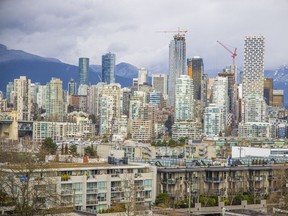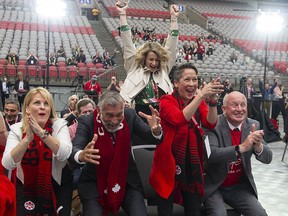The new tax will be charged on short-term accommodations in the city starting Feb. 1 until 2030.

Visitors to Vancouver will be shelling out for an extra 2.5 per cent tax on short-term accommodations to help cover the costs of hosting the FIFA World Cup in 2026.
The major events municipal and regional district tax (MRDT) charges an additional $2.50 on every $100 paid for short-term lodgings, including hotel rooms and accommodations booked through AirBNB or VRBO, starting Feb. 1.
Start your day with a roundup of B.C.-focused news and opinion delivered straight to your inbox at 7 a.m., Monday to Friday.
Thanks for signing up!
A welcome email is on its way. If you don't see it, please check your junk folder.
The next issue of Sunrise presented by Vancouver Sun will soon be in your inbox.
The new tax will be in place for seven years until 2030 and could generate around $230 million in revenue to help pay for planning, staging and hosting FIFA 2026 matches in the city, says the provincial government on Friday.
“We are thrilled Vancouver is a host city to FIFA 2026 and pleased with the collaboration that has already taken place to help ensure this event is a success,” said B.C. finance minister Katrine Conroy in a statement.
“Similar to how the province helped Whistler fund its 2010 Winter Olympics, we’re grateful for all our partners who are working together to give soccer fans, people in the tourism sector and all British Columbians this once-in-a-generation opportunity.”
The province introduced a similar temporary Resort Accommodation Tax in Whistler in 2007 to help pay for the costs of hosting the 2010 Olympic Games.
Vancouver is the first city to take advantage of the tax top-up available to eligible municipalities hosting major international events. The extra tax of up to 2.5 per cent is in addition to the current MRDT, which, in Vancouver, is three per cent.
The MRDT, originally introduced in 1987, is a tax of up to three per cent on short-term accommodations in designated areas of the province meant to raise revenue for local tourism marketing and programs.
Destination B.C. estimates that hosting some World Cup games in 2026 could result in an increase of 269,000 visitors, about half of which will come from outside North America.
Vancouver Mayor Ken Sim said the hosting the FIFA tournament is an “extraordinary opportunity.”
“The economic impacts and benefits to Vancouver will be felt in the leadup to the FIFA World Cup, throughout the event and long after the final whistle blows in 2026,” he said.

Last summer, FIFA announced Vancouver as one of the 16 host cities for the 2026 World Cup. Other cities include Toronto, Los Angeles, San Francisco, Seattle, Dallas, Atlanta, Kansas City, Boston, Philadelphia, Houston, Miami, New York/New Jersey, Mexico City, Monterrey and Guadalajara.
At the time of the announcement, the estimated cost for hosting the FIFA World Cup in B.C. was between $240 million and $260 million.
Early estimates from Destination B.C. and B.C. Stats estimate that the World Cup could bring in more than $1 billion in new revenue to the tourism sector during the tournament and for five years afterwards depending on the number of matches played in Vancouver.
chchan@postmedia.com
twitter.com/cherylchan


